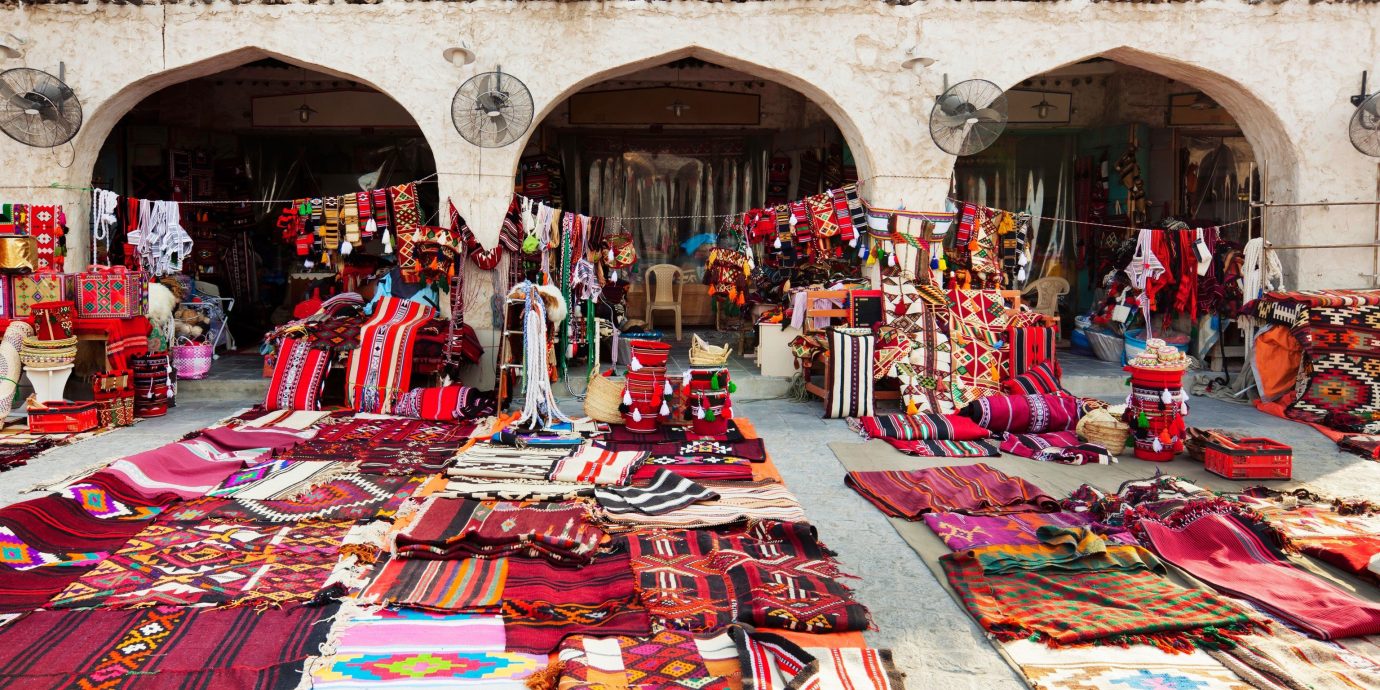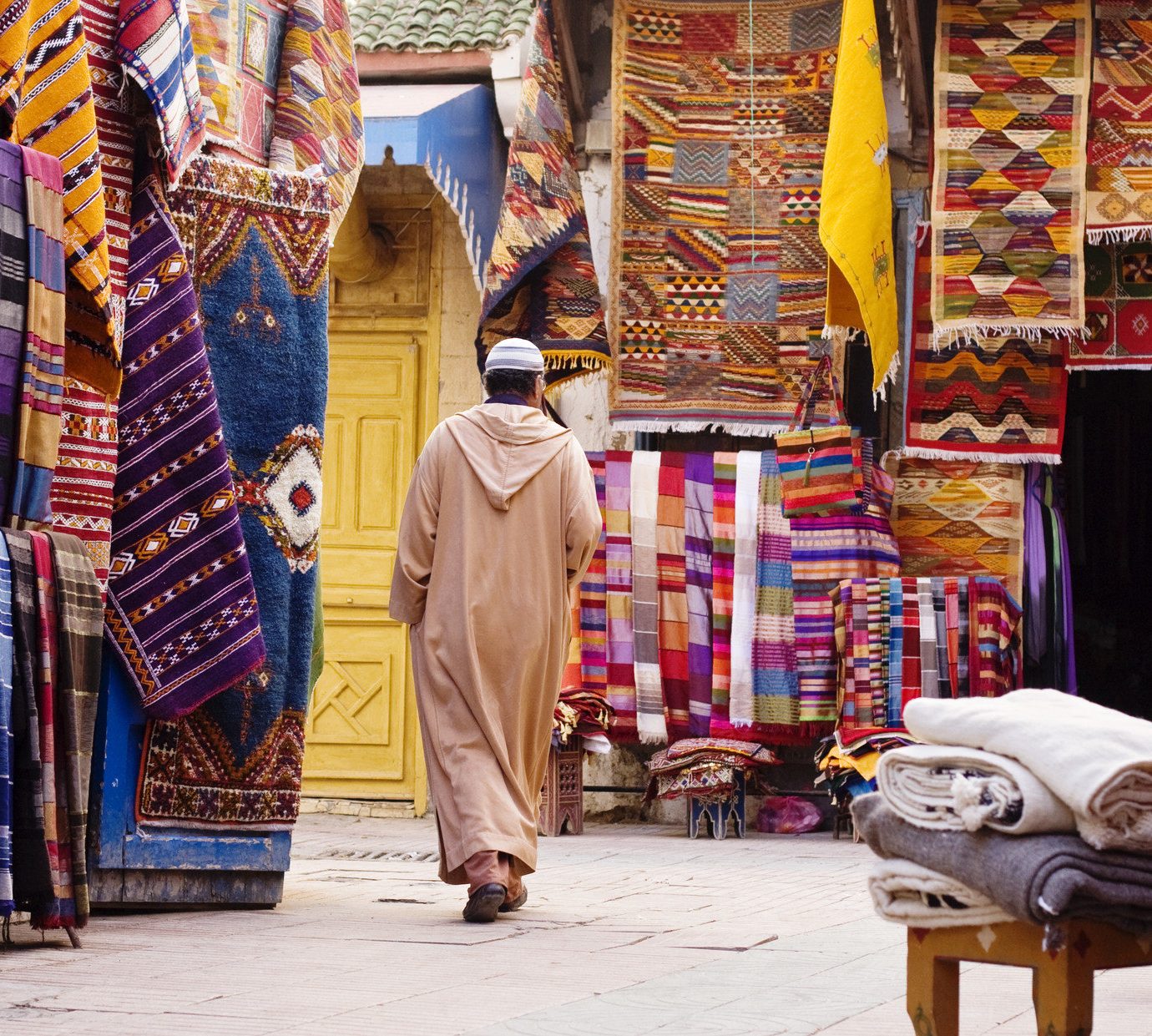
How to Shop the Souks of Marrakech Like a Pro
It's almost impossible to visit Marrakech without stuffing an extra suitcase full of goodies to bring home. Here, our best tips and tricks for navigating the souks.
Chelsea is Brooklyn-based travel writer, editor, and photographer. When not home eating her way through NYC, she's gallivanting across the globe, sailing the coast of Croatia or hiking the peaks of Peru. Her superpowers include booking flight deals and sleeping in small plane seats.
Marrakech is like Aladdin’s Cave of Wonders: silver trinkets, rich textiles, intricate pottery (and maybe even some magic carpets!) are as far as the eye can see. But don’t let the sheer quantity of goods fool you—you’ll have to work for your treasures. And when you’re up against pros who’ve mastered the art of haggling over thousands of years, you’ll feel like amateur-hour. So to avoid scams, here are 12 tips to get you the gold.
Practice before you purchase.
This is not your average trip to the mall—you’ll be lost in labyrinthine souks, overwhelmed by colors and crafts (lanterns, rugs, spices, leather, jewelry, pottery, the list goes on!), while vendors hawk wares and herd you into their shops. To avoid first timer’s fear, you can do two things: go to a fixed-price market to gather intel on typical costs or practice bargaining before you hit the big league. For example, I did a few rounds going through the rhythm of haggling before actually purchasing anything.
Set a mental price beforehand.
When you see something that piques your interest, ask yourself how much you actually want to spend on it. The local businessmen are experienced and will pressure you, but don’t budge and you’ll be rewarded.
RELATED: How to Pad Your Travel Fund
Wear a poker face.
Though you may feel bad about ignoring a shopkeeper’s greeting, just give him a polite nod, and he will be more likely to back off while you browse. Secondly, always appear hesitant; if you show you’re in love with something, you lose your bargaining power.
Avoid small talk.
Sellers will use introductory chit chat—Where are you from? Is this your first trip to Morocco?—to get a sense of how high they can charge you (and how novice you may be at bargaining). Tell them that you have been to the city many times before and, if you can speak French or Arabic, you’ll have the upper hand. Most vendors are fluent in dozens of languages, so they can converse in English, but if they find out you’re American, they’ll raise the price higher.
Beware the mint tea.
No matter how tempting the refreshing mint tea may be, accept the offer at your own peril. Once you’re seated and sipping the drink, the shopkeepers will make you feel obligated to buy something after you’ve finished the cup.
RELATED: Our Wackiest Travel Rituals
Aim to meet in the middle.
The general rule of thumb is to offer one third of what the seller first quotes and go from there. Yes, he’ll look astonished and laugh as if what you offered was ridiculous, but it’s all part of the charade. The goal is to try and haggle halfway, so if he originally asked for 300 dirhams ($30), aim for 150 dhs—but all the power to you, if you think you can go lower! (I scored a pashmina for $10!)
Be patient.
The haggling process is not a quick one. You won’t be shouting numbers in rapidfire back and forth like an auction. You’ll most likely be at the shop for at least 15 minutes. So be patient. It’s also not uncommon for the vendor to switch topics midway through bargaining to try and throw you off guard (or make you forget the price you were asking). Stay calm, answer politely, then resume shilling.
Point out flaws.
We’ve all been there—you bought a gem and realized it was a cheap rip-off. Avoid this with some handy tricks: check to see if leather has an odor; if it smells like sh*t (literally), don’t buy it! Also, rub a wet rag on it to see if the dye comes off. Or, with argan oil, make sure it has a nutty scent. If you don’t mind a few dents or scratches, use the flaws to your advantage. Point out imperfections (a bent leg on a tea set, a chipped plate, etc.) to either bargain down the price or get a better item.
Have exact change.
Pretend you’re leaving the next day and tell the stall owner that you only have a bit of money left. (It’s smart to have the cash in-hand, so they don’t call your bluff if they see your wallet stuffed with bills.) And only give them exact cash; there’s no faster way to piss them off than haggling something down to 150 dirhams just to hand them 200 and ask for change.
RELATED: 8 Credit Card Fees to Watch Out For
Never think you’re not paying enough.
Don’t be fooled by comments like “I’m giving you a deal” or “I can’t possibly go any lower” or “I’m selling at a loss.” This is a trick to make you think what you’re asking isn’t realistic. In reality, the salesman won’t actually agree to the sale unless he is making a profit. So never feel bad about paying too little.
Know when to walk away.
The exit strategy is by far one of the smartest, though it’s a gamble. Most of the time, if you shake your head and start to walk away, they’ll follow you shouting lower prices so they don’t lose the sale altogether. If this happens, congrats, you played it right!
Avoid buyer’s remorse.
Remember, there is no such thing as the correct price. Don’t obsess over if you’ve paid too much; if you shook on what you aimed to spend, and you’re happy with the purchase, then the price was right.
Want more?
- 72 Hours in Marrakech
- How to Avoid WiFi Scams While Traveling
- The New ATM ‘Scam’ That Targets Travelers
Comments
All products are independently selected by our writers and editors. If you buy something through our links, Jetsetter may earn an affiliate commission.
Become a Jetsetter.
Use our insider connections to know where to go and what to do.
By proceeding, you agree to our Privacy Policy and Terms of Use.
Thanks for Signing Up!




